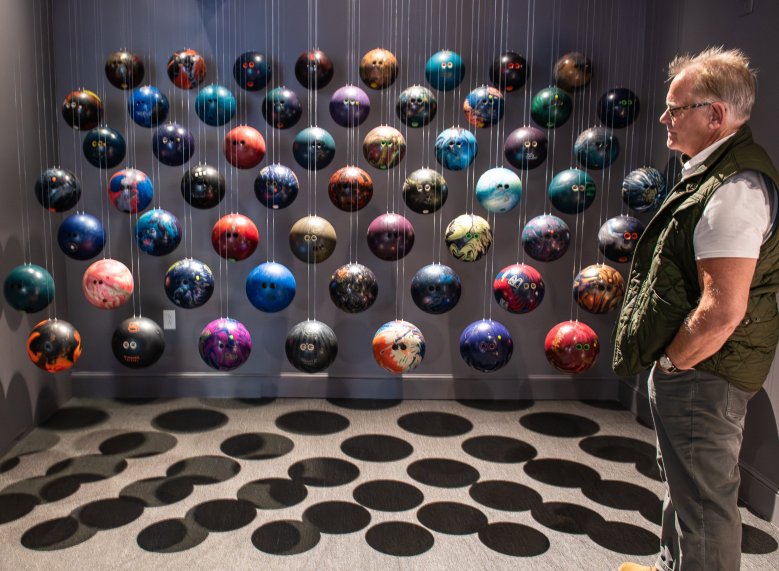**“Familiar Faces”: A Commemorative Art Installation Reflecting on Lewiston’s Mass Shooting**
Visual artist Ian Trask has spent the past several months developing a powerful installation titled *“Familiar Faces”* at Maine MILL, commemorating the mass shooting that occurred in Lewiston on October 25, two years ago. This piece marks the first time Trask has tackled such a heavy and emotionally charged topic through his art.
The installation features 59 bowling balls sourced from Just-In-Time Recreation and 58 billiard balls from Schemengees Bar and Grille. These items are part of a larger collection of roughly 2,000 artifacts gathered by Lewiston’s Maine MILL Museum of Innovation, Learning and Labor from the two sites where 18 people tragically lost their lives, according to Maine MILL Executive Director Rachel Ferrante.
Many of the collected pieces were left outside the buildings or discarded by the businesses, with the bowling and billiard balls among these poignant remnants. Each year, the museum dedicates a new exhibit in its Memorial Room to honor the victims of the mass shooting. These exhibits often incorporate art installations, Ferrante explained.
“There are some objects that I think have incredible power and emotion associated with them,” Ferrante said. “Those pieces in particular evoke exactly where this horrible tragedy happened and I think transport you right back to the moment that night in a way that not every object does. It’s very familiar for anybody, regardless of how they were related to this incident.”
The Memorial Room serves as a space for reflection, focusing on resilience and community. However, what visitors take away from the exhibits often depends on their personal connection to the event. Ferrante emphasized the importance of the museum’s role: “This was a significant event in Lewiston’s history, and our responsibility is to reflect that back to the community in a way that offers remembrance, resilience, and maybe healing.”
In March, Ferrante reached out to Ian Trask to commission an artwork using the collected bowling and billiard balls. Trask, hailing from Topsham, is known for working with reclaimed materials, often repurposed from waste. While he has previously created pet memorials, *“Familiar Faces”* is the first commissioned piece he has undertaken with such an emotionally heavy theme.
“At first, I didn’t think I was capable of creating such a piece,” Trask shared. “There was definitely a process of convincing myself that I was capable of doing this—not just technically because working with those materials was already a unique challenge—but making them convey something interesting, sensitive, and powerful about such a complicated subject.”
Despite initial doubts, Trask found inspiration by studying memorials for other tragedies, including one commemorating the lynching of Black people in Alabama and the white “ghost bikes” left at sites of cyclist fatalities in New York City.
A key decision in his artistic approach was to suspend the bowling and billiard balls in the air—a technique often featured in his work. Bowling and billiard balls are typically associated with movement, loud sounds, and recreational settings. By suspending them, Trask aimed to remove them from their familiar context.
“We’re used to seeing bowling and billiard balls moving, colliding, and making distinct sounds,” he explained. “By contrast, I wanted to freeze them in space and silence them, making them still.”
Careful consideration went into how each object is oriented. Trask found a compelling arrangement for the bowling balls: their finger holes face forward, resembling eyes that peer back at viewers like spectators themselves. This orientation pulls viewers into the installation’s emotional gravity, reminding them of the enormity of what unfolded that night in two places—venues once meant for gathering and social bonds, now forever marked by terror.
A poignant centerpiece of the installation features four bowling balls and six billiard balls painted white. These are broken, partially shattered, and framed by smaller shards—symbolizing grief, loss, and the feeling of being incomplete.
“Grief is this state of being left incomplete, holding onto pieces that no longer fit back together,” Trask reflected. “For many, it’s a lifelong process figuring out how to be themselves again, knowing an important part is missing.”
Trask also acknowledged the broader cultural context surrounding mass shootings in the United States. The frequent occurrence and extensive media coverage have, in his view, distanced people from the true impact of these tragedies. While his installation is not explicitly political, he hopes it encourages meaningful reflection on gun violence and inspires conversations about prevention.
Ultimately, Trask wants visitors to experience a deep emotional connection with *“Familiar Faces”*—to have a moment that challenges their beliefs and influences their actions. The objects on display, present during the tragic event, become silent witnesses telling their story through their presence.
“As you enter the gallery, you’re positioned between two installations resembling crowds staring at you,” Trask described. “These objects witnessed the event—they were there, and in a way, they’re telling their story. Their gaze draws you in and makes you part of the piece, prompting you to reflect on where you stand regarding this tragedy and how you might contribute to preventing future ones.”
The installation will remain on display at Maine MILL until the museum relocates to its new site, expected sometime next year, according to Ferrante.
**Visiting Information:**
– **Location:** Maine MILL Museum of Innovation, Learning and Labor, 35 Canal St., Lewiston (Bates Mill Complex, off Chestnut Street; entrance faces Canal Street)
– **Hours:** Wednesday through Saturday, 10 a.m. – 4 p.m., or by appointment outside these hours
– **Admission:** Free
*“Familiar Faces”* offers a moving tribute to those affected by the Lewiston tragedy, inviting visitors to remember, reflect, and engage with the ongoing conversation about healing and community resilience.
https://www.sunjournal.com/2025/10/24/bowling-billiard-balls-become-art-in-honor-of-lewiston-shooting-victims/
